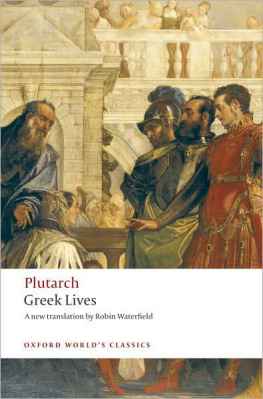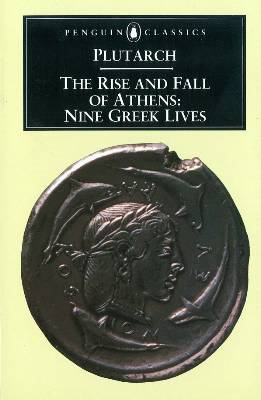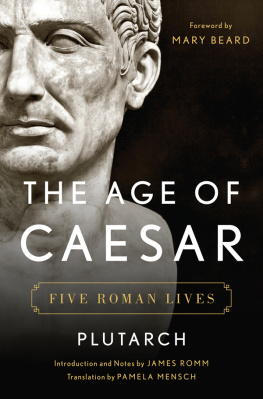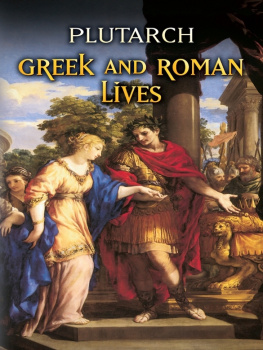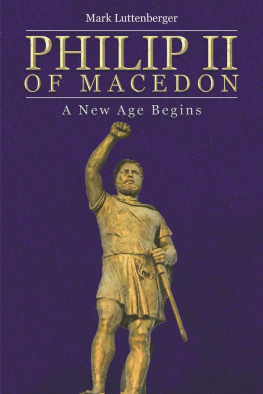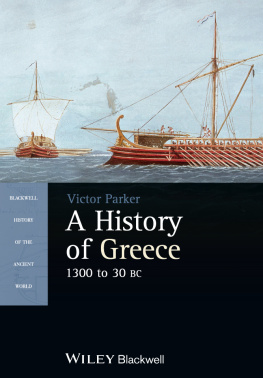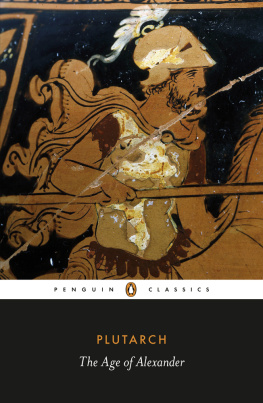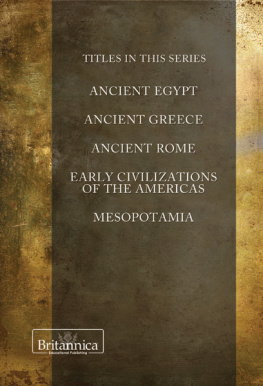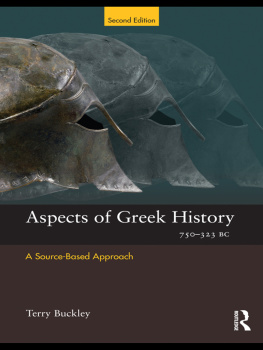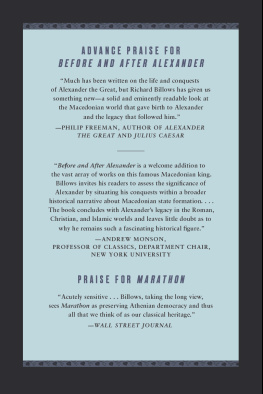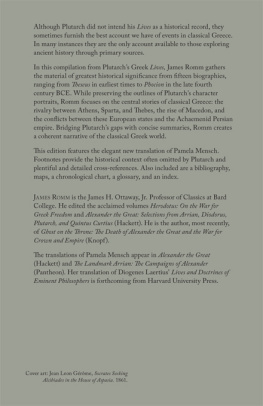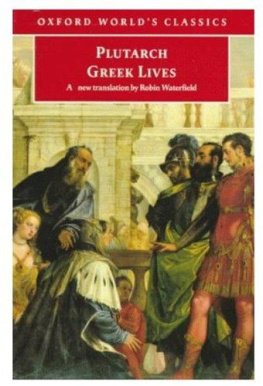
OXFORD WORLDS CLASSICS
HELLENISTIC LIVES
PLUTARCH was born about 45 CE, and lived most of his life in the small town of Chaeronea in central Greece, dying some time after 120. In the first decades of the second century CE, when he did much of his writing, the Roman empire was in its most prosperous and peaceful period. Plutarch wrote a large number of dialogues, treatises, and essays covering diverse subjects, such as the oracle at Delphi, vegetarianism, and the nature of love, which are loosely classified as his Moralia or Moral Essays. Alongside these essays Plutarch created a collection of forty-six biographies of ancient Greek and Roman statesmen, arranged in pairs (parallel), a Roman matching a Greek. These Parallel Lives were written when he was at the height of his powers, and are his major and enduring achievement. Drawing upon earlier histories, anecdotes, inscriptions, and his own researches and broad acquaintance, he shaped masterful portraits of the most famous figures of the classical world. The value of the Parallel Lives as a historical source, questioned in the nineteenth century, has been reaffirmed by recent scholarship.
ROBIN WATERFIELD is a writer, living in Greece. His previous translations for Oxford Worlds Classics include Platos Republic and five other editions of Platos dialogues, Aristotles Physics, Demosthenes Selected Speeches, Herodotus Histories, Polybius Histories, Plutarchs Greek Lives and Roman Lives, two editions of Euripides plays, Xenophons The Expedition of Cyrus, and The First Philosophers: The Presocratics and the Sophists.
ANDREW ERSKINE is Professor of Ancient History at the University of Edinburgh. He is a specialist in Hellenistic history and Roman imperialism, and the author of a number of books, including The Hellenistic Stoa: Political Thought and Action (1990, 2011) and Roman Imperialism (2009), and the editor of A Companion to the Hellenistic World (2003).
OXFORD WORLDS CLASSICS
For over 100 years Oxford Worlds Classics have brought readers closer to the worlds great literature. Now with over 700 titlesfrom the 4,000-year-old myths of Mesopotamia to the twentieth centurys greatest novelsthe series makes available lesser-known as well as celebrated writing.
The pocket-sized hardbacks of the early years contained introductions by Virginia Woolf, T. S. Eliot, Graham Greene, and other literary figures which enriched the experience of reading. Today the series is recognized for its fine scholarship and reliability in texts that span world literature, drama and poetry, religion, philosophy, and politics. Each edition includes perceptive commentary and essential background information to meet the changing needs of readers.

Great Clarendon Street, Oxford, OX2 6DP
United Kingdom
Oxford University Press is a department of the University of Oxford. It furthers the Universitys objective of excellence in research, scholarship, and education by publishing worldwide. Oxford is a registered trade mark of Oxford University Press in the UK and in certain other countries
Translation Robin Waterfield 2016
Editorial material Andrew Erskine 2016
The moral rights of the authors have been asserted
First published as an Oxford Worlds Classics paperback 2016
Impression: 1
All rights reserved. No part of this publication may be reproduced, stored in a retrieval system, or transmitted, in any form or by any means, without the prior permission in writing of Oxford University Press, or as expressly permitted by law, by licence or under terms agreed with the appropriate reprographics rights organization. Enquiries concerning reproduction outside the scope of the above should be sent to the Rights Department, Oxford University Press, at the address above
You must not circulate this work in any other form and you must impose this same condition on any acquirer
Published in the United States of America by Oxford University Press 198 Madison Avenue, New York, NY 10016, United States of America
British Library Cataloguing in Publication Data
Data available
Library of Congress Control Number: 2015934066
ISBN 9780191641206
Printed in Great Britain by
Clays Ltd, St Ives plc
Preface
THE Greek text used as the basis for this translation is the Teubner edition. All deviations from the Teubner text have been marked in the translation with an obelus, which refers the interested reader to a note in the Textual Notes section at the back of the book. An asterisk in the text means that there is a note on that passage in the Explanatory Notes.
The translation of the Life of Alexander that appears in this book is a somewhat revised version of the one that first appeared in the 1998 Oxford Worlds Classic Plutarch: Greek Lives. The notes from that volume, written by Philip Stadter, have been replaced for this volume with notes by Andrew Erskine.
Writing this book has been an enjoyable work of collaboration. We would also like to thank Shane Wallace for his careful reading of sections of the typescript.
IN 331 BCE Alexander the Great defeated the Persian king at Gaugamela in modern Iraq, deep inside the Persian empire. This was a turning-point in the history of the eastern Mediterranean. Persia had ruled a huge territory, from the Aegean Sea to the edges of India, and its formidable presence in the East had shaped Greek thinking on international relations since the two Persian invasions at the beginning of the fifth century. Now a small kingdom in the north of Greece had toppled it and the Persian empire had become a Macedonian empire.
Alexanders astonishing success was built on the foundations laid by his father, Philip II. In 359 Philip had inherited an unstable and vulnerable kingdom, one ill equipped to deal with the hostile forces that surrounded it, but by the time of his death Macedon had been transformed. Far from being at the mercy of its neighbours, it had become the dominant state on the Greek mainland. The army that Philip had created provided Alexander with his main instrument for the defeat of Persia. Philip himself was already in the early stages of a campaign against Persia at the time of his assassination in 336, but it is likely that what he intended was rather different from the campaign carried out by Alexander. Philip probably had the limited objective of liberating the Greek cities of Asia Minor from Persian rule, a long-standing Greek aspiration. It is impossible to know how ambitious Alexanders initial plans were, but the result is clear: a Macedonian empire that stretched from the Balkans to Afghanistan.
But no united empire under the command of a single Macedonian king lay in the future. In 323 Alexander died, leaving no obvious heir and making no provision for the succession. The result was decades of conflict between Macedonian warlords and the consequent fragmentation of the empire (for a brief review of the wars of the Successors see below). Out of that conflict emerged three main dynasties: the Ptolemies, whose kingdom was centred on Egypt; the Seleucids, who with Syria and Babylonia under their control held the core of the old Persian empire; and the Antigonids, who occupied the throne of Macedon itself and exerted considerable influence over mainland Greece. A fourth dynasty, the Attalids, whose influence was largely limited to Asia Minor, would establish itself in the late third century.
Next page

